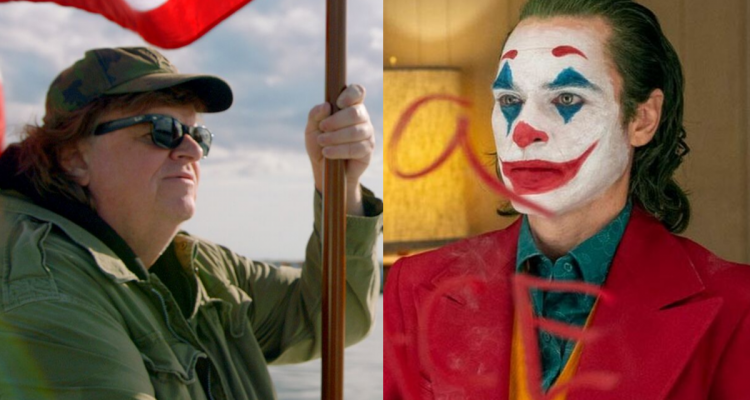Just as we all expected: “Joker” has found its champion, and his name is Michael Moore.
Earlier this week, the well-known documentarian caught a screening of Todd Phillips‘s controversial superhero movie at the New York Film Festival. After (seemingly) letting his thoughts percolate for a few days, Moore finally unleashed an essay-length Facebook post about the movie, overtly tying it to contemporary politics and praising the film for its embrace of ’70s classics like “The French Connection” and “Dog Day Afternoon.”
READ MORE: Todd Phillips Explains Why He Left Comedies for ‘Joker’
Clocking in at 1,074 words, Moore’s post is too long to share in its entirety, but this one particular section seems to sum up Moore’s thoughts better than the rest.
The violence in “Joker”? Stop! Most of the violence in the movie is perpetrated on the Joker himself, a person in need of help, someone trying to survive on the margins of a greedy society. His crime is that he can’t get help. His crime is that he is the butt of a joke played on HIM by the rich and famous. When the Joker decides he can no longer take it — yes, you will feel awful. Not because of the (minimal) blood on the screen, but because deep down, you were cheering him on – and if you’re honest when that happens, you will thank this movie for connecting you to a new desire — not to run to the nearest exit to save your own ass but rather to stand and fight and focus your attention on the nonviolent power you hold in your hands every single day.
Setting aside Moore’s evaluation of the film—we’ve written plenty of words about the merit of “Joker” as a provocative work of art—it’s easy to see why Moore feels such a strong connection to the film. The idea of a grassroots movement against those in power appeals to the filmmaker’s politics, and his frustrations with the state of our garbage world seem to have put him in the awkward position of being a message in search of a medium. We’ve had decades to grapple with the violent and complex themes of movies like “Dog Day Afternoon,” and plenty of its contemporaries—films that were also attempting to say something about current issues—have faded from Hollywood canon as our own opinions have evolved. Three days doesn’t seem like enough time to crown any film the beginning of a populist movement.
READ MORE: ‘Joker’ Review: Todd Phillips Lets a Grotesque, Green-Haired Genie Out of the Bottle
There’s a lot to write about with regards to “Joker,” but in the most charitable reading, the lasting cultural impact of any film is slippery. Choosing to hitch your revolutionary rhetoric to this particular character seems odd, especially when you’ve already suggested another film that is overtly about nonviolent activism was one of your most significant influences of the past decade. Can’t you remind people to go watch “Selma” again?
On Wednesday night I attended the New York Film Festival and witnessed a cinematic masterpiece, the film that last month…
Posted by Michael Moore on Saturday, October 5, 2019

